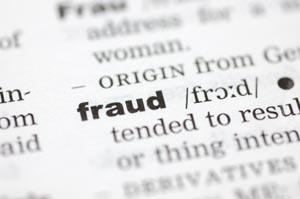I Don’t Know What I Would
Have Done Without Him...
Fraud
Chicago Fraud Criminal Defense Attorney
Defense of Financial Crimes Misappropriation of Funds– Cook County White Collar Crime Lawyers

Fraud offenses in Illinois may include a broad range of criminal offenses that involve intentional deception of another person or group of individuals that cause injury to the other person(s) for personal gain. Depending on the precise type of fraud involved, the conduct may include use of the Internet, phone or mail. Other types of fraud may involve an institution or industry like insurance, securities, banking, medical insurance, or credit card companies. Some fraud charges fall under the jurisdiction of federal law, such as tax fraud, Medicaid or Medicare fraud so they are investigated by federal law enforcement authorities.
The range of fraud related offenses encompasses crimes like identify theft, social security fraud, embezzlement, check fraud, false advertising, credit card fraud, mortgage fraud, investment fraud and more. With the increased focus on white-collar crime by federal law enforcement authorities in recent years because of massive loses in retirement funds, prosecutors have become extremely zealous about pursuing financial crimes by charging each transaction as a separate criminal offense. While fraud type financial crimes can be a state crime under Illinois law or a federal offense, the consequences in many cases may include a felony conviction and a lengthy term in prison.
Identity Theft
An individual commits identity theft when he or she utilizes personal information like another person’s social security number, name, credit card number or banking information without consent for the purpose of seeking financial gain. Whether you are charged under federal or state law, identity theft is a serious criminal charge so you should immediately assert your Miranda rights and contact an experienced Chicago identity theft attorney like David L. Freidberg.
While identity theft is a serious offense, the penalties depend on a variety of factors, which include the specific conduct, state or federal offense and the extent of the damages suffered by the victim. We have provided a summary of penalties under Illinois law for identity theft below:
| Dollar Amount at Issue | Grading of Offense | Term of Incarceration | Fine |
| Under $300 | Class 4 Felony | 1 to 3 years in state prison | Up to $25,000 |
| $300 to $2,000 | Class 3 Felony | 2 to 5 years in state prison | Up to $25,000 |
| $2,000 to $10,000 | Class 2 Felony | 3 to 7 years in state prison | Up to $25,000 |
| $10,000 to $100,000 | Class 1 Felony | 4 to 15 years in state prison | Up to $25,000 |
| Over $100,000 | Class X Felony | 6 to 30 years in state prison | Up to $25,000 |
Social Security Fraud
This form of fraud occurs when a person uses the social security numbers of others to commit identity theft or to obtain social security or disability benefits. Conduct that may amount to fraudulently obtaining social security or disability benefits include making false statements when filing claims or misrepresenting material facts or events that affect eligibility. Other forms of conduct that may be charged as social security fraud include engaging in transactions to buy and sell social security card information or a payee depriving a beneficiary of social security benefits for personal expenses.
Check Fraud
While check fraud can take many forms, the offense essentially involves the use of a check to unlawfully acquire assets of funds that belong to someone else. Financial institutions are diligent about pursuing criminal charges in cases involving Financial Institution Fraud and check fraud to discourage similar conduct by others. The severity of punishment associated with a check fraud offense depends on the value of the assets or money acquired, the complexity of the scheme to obtain the assets and prior convictions for similar offenses. Some of the varieties of conduct that constitute check fraud include:
Passing a Bad Check: Most people have written a bad check at some point whether intentionally or unintentionally. While writing a check without sufficient funds to cover the check (referred to as “NSF”) is a mistake made by many, it constitutes a criminal offense and can be charged as a felony. If you write a check with “insufficient funds,” you may also face civil penalties of up to three times the face value of the check up to a maximum of $1,500 as well as court costs and attorney fees. Writing a check on someone else’s account is a more serious form of Bank Fraud that can lead to more serious penalties.
Using a Forged Check: Charges of forging a check may apply to altering or adding information to a check, such as signing the check in another’s name, endorsing the check to yourself, changing the amount of the check or altering it in another way.
Kiting Checks: This type of fraud scheme essentially involves writing checks in increasing amounts as they are run through multiple bank accounts so that funds are obtained in excess of what the individual has in the bank. While improvements in the sophistication of banking technology have made this offense less common, it still may be charged as a serious felony offense under Illinois law.
Check Floating: Many people routinely write checks to cover funds that are anticipated but have not yet become available in one’s bank account. Although this may be a necessary financial measure to survive between paychecks, it may result in a felony charge and possible conviction in Illinois.
The penalties associated with check fraud increase significantly with the amount of funds allegedly obtained through the passing of a bad check. A general overview of the penalties are provided in the chart below:
| Dollar Amount at Issue | Grading of Offense | Term of Incarceration | Fine |
| $300 or below | Class A Misdemeanor | Up to a year in jail | $25,000 |
| $301 to $10,000 | Class 3 Felony | Up to 5 years in state prison | $25,000 |
| $10,001 to $100,000 | Class 2 Felony | Up to 7 years in state prison | $25,000 |
| $100,001 and higher | Class 1 Felony | Up to 15 years in state prison | $25,000 |
Embezzlement
Embezzlement involves fraudulently taking the funds or assets of another person or financial institution when a relationship of trust exists between the accused and the individual or entity that owns the money or property. This felony offense may include a range of factual situations and dollar values that affect the seriousness of the penalties. Chicago embezzlement criminal offenses may cover the spectrum from an employee in a retail store stealing merchandise from an employer to an accountant distorting or “cooking” a company’s financial books to divert funds from the company.
These are only a few examples of white-collar offenses and financial institution fraud that may carry severe consequences, which include jail or state prison time, a felony conviction on one’s criminal record, substantial fines and other penalties. The impact of a conviction for fraud-related crimes will have lasting impact beyond the formal sentence that may include consequences involving immigration status, employment, educational opportunities, housing options and loss of certain Constitutional rights.
Experienced Chicago fraud criminal defense lawyer David L. Freidberg conducts a thorough investigation and analysis of the facts to identify the best defense strategy to protect his clients’ liberty and future. Mr. Freidberg may seek to have computer data or financial documents excluded because they are obtained through an unlawful search or seek exclusion of incriminating statements that are involuntary or obtained in violation of Miranda. We seek acquittal or dismissal where possible based on procedural or substantive grounds. Where this possibility is unrealistic, Mr. Freidberg aggressively fights to obtain the best possible plea agreement. We offer an absolutely confidential consultation so that we can explain your rights and discuss your options. We invite you to contact us at 312-560-7100 or email us to learn how we can help.



